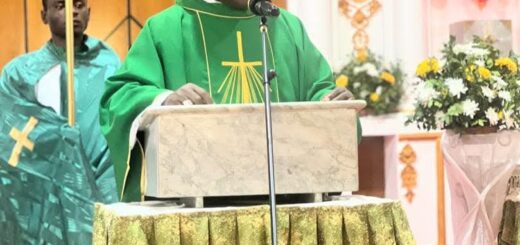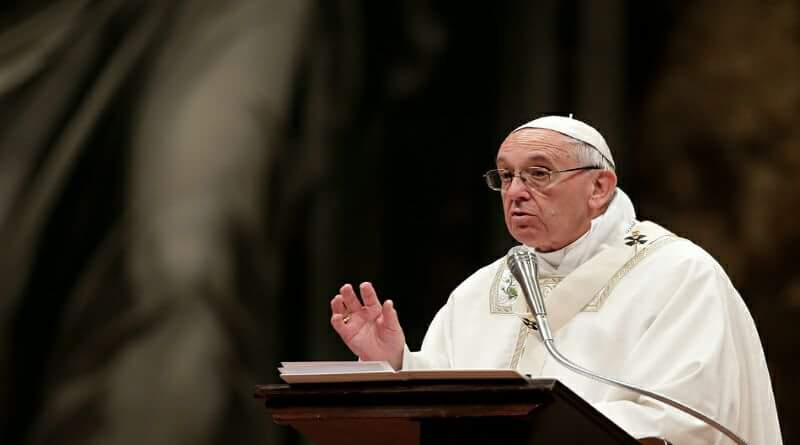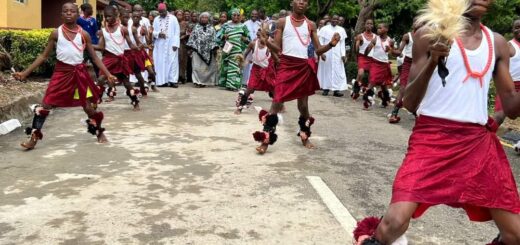God of Everlasting Mercy
by ARCH BISHOP · April 16, 2023
Divine Mercy Sunday (2nd Sunday of Easter), 16th April, 2023. Mass at Our Lady Queen of Nigeria Pro-Cathedral, Abuja. Homily by Archbishop I. A. Kaigama
Readings: Acts 2:42-47; 1 Peter 1:3-9; John 20:19-31
God of Everlasting Mercy
All of us gathered here are beneficiaries of Divine Mercy. Take a good look at yourself and those seated around you and you will realize that who you are, and what you look like, is the work of God the Divine Potter. We are the work of His hands (cf. Is. 64:8). Eucharistic prayer number four gives praise to God who fashioned His works in wisdom and in love, formed man in His own image and entrusted the whole world to his care. When through disobedience man lost God’s friendship, God did not abandon him to the domain of death. He sent His Only Begotten Son to be our Saviour, made incarnate by the Holy Spirit and born of the Virgin Mary. He gave Himself up to death and, rising from the dead, He destroyed death and restored life. Here we see God’s act of mercy. The opening prayer of today’s liturgy addresses the Father as “God of everlasting Mercy” and the responsorial psalm repeats that “His steadfast love endures forever.”
Following the canonization of Maria Faustina on April 30, 2000, the Holy Father, Pope John Paul II, officially decreed that the second Sunday of Easter be also celebrated as Divine Mercy Sunday. St. Maria Faustina was privileged to receive apparitions from Jesus, emphasizing that those who go to sacramental confession prior to, and receive Holy Communion today will receive forgiveness and total remission for their sins. The feast of Divine Mercy therefore focuses on the merciful and radiant love that flows from the heart of Christ for the salvation of the world.
The first reading, recalling the deeds of the Apostles, explains how the risen Lord continued to show mercy through the ministry of the Apostles in the early Church. The early Church was a community in which no one was left in abject poverty or misery because they held all things in common. They demonstrated not only a strong sense of communal living, but also mercy in action.
The qualities that guided the early Christian community are no doubt in short supply in our contemporary world. In Nigeria, people suffer discrimination in the civil and political space on account of their ethnic, religious, or political affiliations. How the early Christian community equitably distributed the proceeds of their sales should be a model for our social, political and national life. Nigeria is blessed with enormous material resources, but the deep-seated corruption associated with public service has seen the gross mismanagement and embezzlement of our common patrimony. Until our national wealth is distributed equitably and the needs of the populace at the lowest levels are met, we will continue to experience the devastating effects of social retardation. Nevertheless, our second reading from the first letter of Saint Peter provides words of encouragement and comfort to strengthen our faith. We are assured of the presence of the merciful Lord to enable us to fight every fear with faith and counter our uncertainties with trust and hope, hope that someday, somehow, things will be better.
The gospel reading narrates the apparition of Jesus to His disciples in the evening of His resurrection. Jesus came among them and greeted, “peace be with you” (Jn. 20:19), the same disciples who had denied and deserted Him during His passion and crucifixion. Rather than appearing to them as a judge to condemn His unfaithful servants, He came to them as a Merciful Messiah. Having forgiven them, He sent them out as missionaries of mercy. By so doing, He was commissioning the Church to perpetuate this ministry of mercy. He also gave them power to forgive and to retain sins, one of the biblical roots of the sacrament of penance.
We are told that Thomas was not there at the first appearance of Jesus and would not believe the testimony of the other 10 Apostles. When Jesus appeared eight days later, He called Thomas to place his finger in His wounds and hand into His side and be believing (v. 27). Thomas was led to deep faith which he made in the expression of faith and became the first to recognize the divinity of Christ when he said, “My Lord and my God” (v. 28).
Lessons:
• On this Sunday of Mercy let us like Thomas express our faith deeply saying, “Jesus, I trust in you.”
• Know that faith is not dependent on the evidence of the senses.
• Peace is the fruit of forgiveness. Forgive and ask for forgiveness.
• Jesus did many signs in the presence of the disciples that were not written (cf. Jn. 20:30-31). This helps to explain the authority of Sacred Tradition in the Catholic Church.
• God gave the Apostles the power to forgive sins (cf. Jn. 20:23), a power handed to the priests. Go to confession regularly and be at peace with God and with neighbour.




